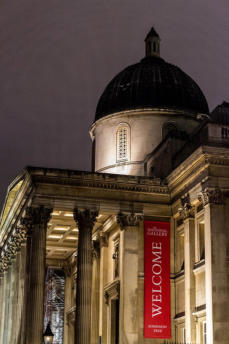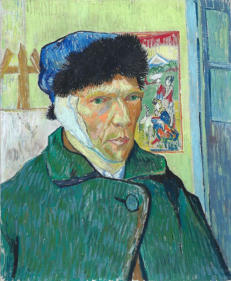The Arts Society Rutland
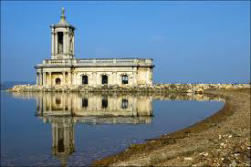
Meetings take place at the Raven in Corby, 63 Rockingham Road, NN17 1AG
at 11am please be seated before then.
Coffee will be available from 10.15 with Hugh the Membership Secretary ready at the
desk to welcome you as you come in and register.
Members wishing to bring a guest, at a fee of £10, should contact Hugh Henderson
0797 1643 177 or hugh.h23.@icloud.com
****************
There are no lectures in July or August
19 September
Sian Walters
Behind the Scenes at the National Gallery
In 2024 the National Gallery celebrates its 200th birthday. In the run up to this special
anniversary, join me as I explore some of the nation’s best-loved paintings in a new
light, revealing details which cannot be seen with the naked eye and discussing what
goes on behind the scenes in the conservation, framing and scientific departments. The
lecture will result in a greater understanding of not only the art itself, but also of the
work the National Gallery does to care for it, present it and interpret it.
Few of the gallery’s works retain their original frames but an expert team will often
source and adapt examples which complement the paintings historically, or indeed
hand-carve new ones from scratch. We will also look at the
technical challenges involved in hanging, displaying, moving and
framing the collection and the various solutions devised by the Art
Handling Team. Many of the paintings in the gallery were
designed for a very specific function, an altarpiece such as Piero’s
Baptism of Christ for example, so how do the curators allow us to
interpret and view these within a museum context? Finally, we’ll
talk about restoration and conservation, exploring extraordinary
details from works such as the Wilton Diptych, which have only
been discovered recently thanks to scientific analysis.
Join me on a journey of discovery as we explore the hidden
secrets of masterpieces by Bellini, Leonardo, van Eyck and many
more.
I have been a lecturer at the National Gallery for nearly 20 years.
National Gallery, London at night. Photo; MrsEllacott.
Creative Commons Attribution-Share Alike 3.0
17 October
Rosamund Bartlett
The Culture of Ukraine
This lecture tells Ukraine's story through the shared culture which binds its proud
people together. We will explore the sacred art and architecture of Kyiv and its links to
Byzantium, as well as the distinctive characters and ethnicities of Odesa and Lviv.
Tracing Ukraine's complicated multi-ethnic history also means looking at its rich folk
culture traditions. These range from native song and the secret codes embedded in
ancient embroidery, which have exerted a surprising impact on modern painting and
contemporary haute couture, to Cossack dancing and borshch.
21 November 2024
Marissa Beekenkamp-Wladimiroff
Van Gogh’s 444 days in Provence
To celebrate the bicentenary of the establishment of the National Gallery in London a
huge Van Gogh exhibition is planned for 2024! The show
will focus on the artist’s period in Provence where he
painted some of his most recognisable paintings.
Known as his brightest and most expressive paintings,
this is also the period in which he became ill and cut off
his ear. We will look at his own personal struggles and
ambitions, the art that influenced him and the art he
wanted to make.
Despite his time in Provence only lasting about a year
and Vincent not finding the support or recognition he was
craving, the paintings he created in the South of France
would turn out to become some of the most influential,
recognisable and loved paintings ever made by an artist.
Vincent van Gogh - Self-portrait with bandaged ear (1889, Courtauld Institute) Wikimedia
There is no meeting in December
The new membership starts 1st January 2025
Web site and mobile phone pages created and maintained
by Janet Groome, Handshake Computer Training
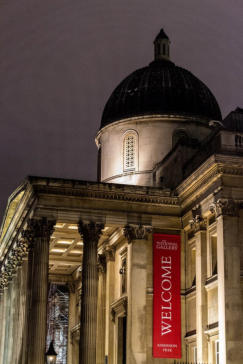
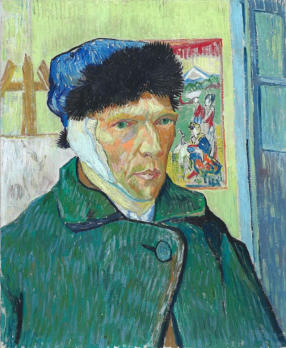
Web site and mobile phone pages designed, created and
maintained by Janet Groome Handshake Computer Training
Meetings take place at the Raven in Corby, 63
Rockingham Road, NN17 1AG at 11am please
be seated before then.
Coffee will be available from 10.15 with Hugh
the Membership Secretary ready at the desk
to welcome you as you come in and register.
Members wishing to bring a guest, at a fee of
£10, should contact Hugh Henderson 0797
1643 177 or hugh.h23.@icloud.com
****************
There are no lectures in July or August
19 September
Sian Walters
Behind the Scenes at the National
Gallery
In 2024 the National Gallery celebrates its
200th birthday. In the run up to this special
anniversary, join me as I explore some of the
nation’s best-loved paintings in a new light,
revealing details which cannot be seen with
the naked eye and discussing what goes on
behind the scenes in the conservation,
framing and scientific departments. The
lecture will result in a greater understanding
of not only the art itself, but also of the work
the National Gallery does to care for it,
present it and interpret it.
Few of the gallery’s
works retain their
original frames but an
expert team will often
source and adapt
examples which
complement the
paintings historically,
or indeed hand-carve
new ones from scratch.
We will also look at the
technical challenges
involved in hanging,
displaying, moving and
framing the collection
and the various
solutions devised by the Art Handling Team.
Many of the paintings in the gallery were
designed for a very specific function, an
altarpiece such as Piero’s Baptism of Christ
for example, so how do the curators allow us
to interpret and view these within a museum
context? Finally, we’ll talk about restoration
and conservation, exploring extraordinary
details from works such as the Wilton
Diptych, which have only been discovered
recently thanks to scientific analysis.
Join me on a journey of discovery as we
explore the hidden secrets of masterpieces
by Bellini, Leonardo, van Eyck and many
more.
I have been a lecturer at the National Gallery
for nearly 20 years.
National Gallery, London at night. Photo;
MrsEllacott.
Creative Commons Attribution-Share Alike 3.0
17 October
Rosamund Bartlett
The Culture of Ukraine
This lecture tells Ukraine's story through the
shared culture which binds its proud people
together. We will explore the sacred art and
architecture of Kyiv and its links to
Byzantium, as well as the distinctive
characters and ethnicities of Odesa and Lviv.
Tracing Ukraine's complicated multi-ethnic
history also means looking at its rich folk
culture traditions. These range from native
song and the secret codes embedded in
ancient embroidery, which have exerted a
surprising impact on modern painting and
contemporary haute couture, to Cossack
dancing and borshch.
21 November 2024
Marissa Beekenkamp-Wladimiroff
Van Gogh’s 444 days in Provence
To celebrate the bicentenary of the
establishment of the National Gallery in
London a huge Van Gogh exhibition is
planned for 2024! The show will focus on the
artist’s period in Provence where he painted
some of his most recognisable paintings.
Known as his
brightest and most
expressive paintings,
this is also the period
in which he became ill
and cut off his ear. We
will look at his own
personal struggles
and ambitions, the art
that influenced him
and the art he wanted
to make.
Despite his time in Provence only lasting
about a year and Vincent not finding the
support or recognition he was craving, the
paintings he created in the South of France
would turn out to become some of the most
influential, recognisable and loved paintings
ever made by an artist.
Vincent van Gogh - Self-portrait with bandaged ear
(1889, Courtauld Institute) Wikimedia
There is no meeting in December
The new membership starts 1st January
2025

